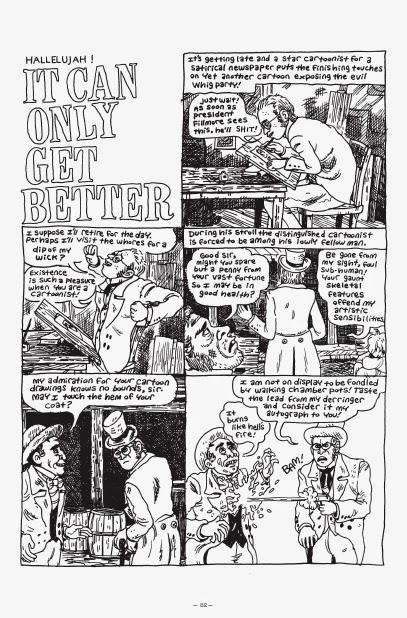Noah Van Sciver, AdHouse Books, Richmond (Virginia, USA), June 2014, 112 pages, softcover, 7" x 10", $ 14.95.
"Noah Van Sciver is a throwback. The kind of cartoonist one saw back in the 1980's. Genuinely interested in characters and stories and real cartooning. If he had been around back then he'd probably have been a star. The guy's got talent. He's probably the next Clowes or Crumb or Brown". These words of Seth, the author of Palookaville, are on the back cover of Youth Is Wasted, the new book by Noah Van Sciver, out in June and of which I read a preview thanks to Chris Pitzer of Adhouse Books. Seth underlines an important fact: Van Sciver is an author interested in characters, in stories and in doing comics. He doesn't deal with experimentalism or with brilliant colors and he doesn't work for other media as the most part of contemporary cartoonists does. He focuses on storytelling and draws in function of the story, without frills. He's also incredibly prolific, since he's continuously publishing comic books, mini-comics, graphic novels and sketchbooks. Most of the comics in Youth Is Wasted are taken from his series Blammo, along with some anthology submissions and 1999, published in an out-of-print comic book for Retrofit Comics. If The Hypo, released by Fantagraphics, is the most challenging work of Van Sciver until today, Youth Is Wasted is a sort of "best of" and an excellent starting point to know one of the best contemporary cartoonists.
In most of his stories Van Sciver draws a gallery of ugly, uncool, sometimes dirty people, acting in an anonymous urban space, often with a sneer on their faces tending to stupidity. They're mostly losers, like Anthony in Abby's Road, Jesus in Who are you, Jesus? and Mark in 1999, three funny but also bitter tales, perfectly representing the typical production of the author, in which sometimes easy-minded, sometimes cynical and resentful characters do humble works and live hopeless relationships, being fooled by a woman smarter than them. Yet it's easy to sympathize with them, maybe because they show themselves as they are, highlighting thoughts and impulses that we all tend to hide. Because I Have To is seemingly similar to these tales, but it's a deeper piece, where the cartoonist from Denver doesn't try to amuse the reader but introduces a reflection on death tinged with melancholy.
In some comics an autobiographical interpretation prevails, though the author's experiences are mixed with stories heard from friends or in a bar, some fiction and a lot of irony and sarcasm. For example we know from his sketchbooks (here the review) and from the notes at the end of this book, that a couple of years ago he broke up with a girl. And so in Expectations the main character is Kramer, who meets his long-time ex-girlfriend at a party. The dialogues are vivid and seem almost real, or perhaps they are. But Van Sciver doesn't limit himself to pure and simple realism. The party scene in Expectations is indeed characterized by a hilarious comparison between a sentimental break-up and a move and it's inserted between two visits to Okane Park, a park built on a cemetery, inspired by a real place in Denver, where Kramer meets a ghost. The cynical irony and the bizarre element are always around the corner, making the author a worthy heir of the underground tradition.
In I Don't Love Anyone, inspired by a dream, the theme is still the break-up, treated efficaciously in only one page. A girl is drunk and thinks to an ex-boyfriend, returns at home sad and alone, but when she goes to bed she realizes that their relationship ended months before and that she entered the apartment where they had lived as a couple, now inhabited by someone else. I Don't Love Anyone shows also a different style, with a clean line work, a feminine lettering and a main character who seems to come out from the pages of Love and Rockets. This is one of Van Sciver's most successful graphic efforts and it shows a remarkable stylistic growth: not surprisingly it was published in the latest issue of Blammo, along with The Wolf and The Fox, the best of the three fairy tale comics in the book, full of lines, details, frames. Then we have some comics based on smart ideas and funny gags, as Punks Vs Lizards, a clash between giant lizards looking to dominate the world and punks as the last bastion of mankind, Roommates, a manifesto of hatred and misanthropy, and especially It Can Only Get Better, in which Van Sciver imagines the wealthy and licentious life of a cartoonist in the nineteenth century.






Da BOMB!
RispondiElimina